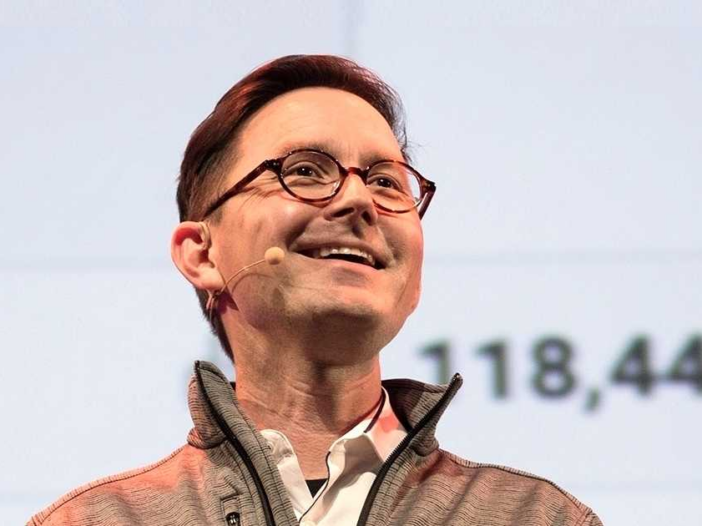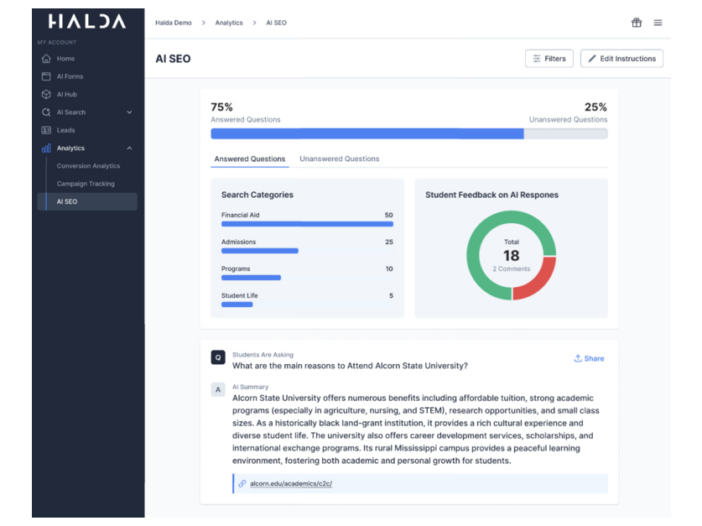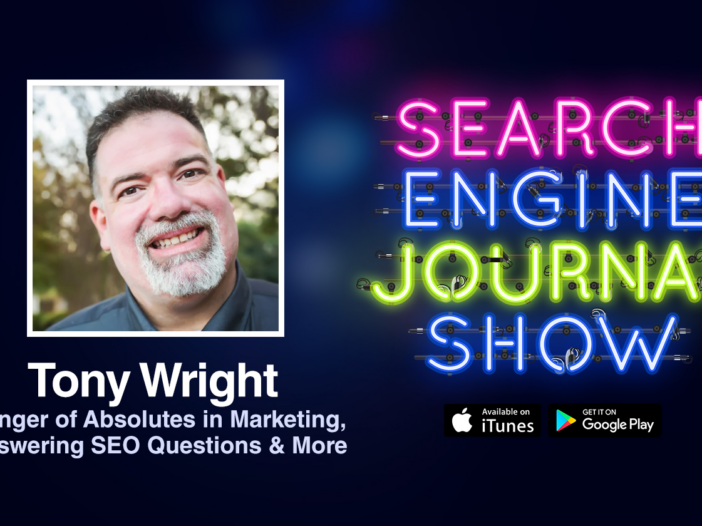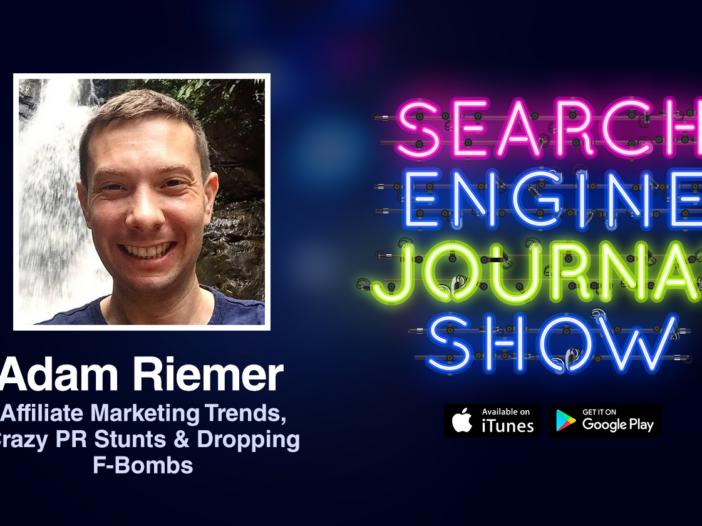hosted by Kerry O’Shea Gorgone
There are people I follow on Twitter, and then there are people whose articles I regularly retweet because they are unfailingly detailed and helpful. Andy Crestodina is in the second category! Andy is a co-founder and the chief marketing officer of Orbit Media, an award-winning 38-person Web design company in Chicago.
Don’t miss a MarketingProfs podcast, subscribe to our free newsletter!
Andy has decades of experience in Web strategy and marketing, and he regularly speaks at the best marketing conferences, including the MarketingProfs B2B Marketing Forum, where this year he’ll talk about Influencers, Search Rankings, and Collaboration.
He’s written hundreds of articles on content marketing, search engine optimization, social media, and analytics, and he wrote the book Content Chemistry: The Illustrated Handbook for Content Marketing.
I invited Andy to Marketing Smarts to talk about influencers and content marketing. Along the way, we also talk about his borderline-insane productivity and how he achieves it!
Here are a few highlights from our conversation (and sneak peeks from our upcoming B2B Marketing Forum):
Do something important before you do something urgent (03:09): “Here’s one of my top productivity tricks. Go to bed instead of staying up and binge-watching shows, because binge-watching does not meet any of [your] goals. Get up early, 5:30 or 6:00 AM. Do something important before you do something urgent. I write, I produce presentations—I’m doing important things before I look at my email.
“Because a small part of you dies the moment you look at your inbox. You get sucked into the ‘urgent’ stuff. And then, when the little boy wakes up at 7:30, I’ve already gotten a lot done. I’ve made important progress on my major goals.”
Some progress each day keeps burnout away (05:23): “I’ve reduced burnout by creating visible tracking for me against my goals. For example, you go to the gym. I’m bad at that, but I do have one exercise goal, which is for 2019 I’m doing 5,000 chin-ups. Which means every morning I’m doing 25 chin-ups…. I have a little chart taped to the wall in my closet. It’s a graph paper, and every box is five chin-ups. So I shade them in. And it’s like one minute or minute-and-a-half of exercise per day…but it keeps me from getting burned out to see that I’m making progress.
“I have a list of every article I’ve ever written. Analytics shows me the performance of everything that I’m doing. If you create visible ways to track your progress against all of your goals, you’re less likely to burn out because you’re always seeing evidence of progress and effort.”
“Influencer marketing” isn’t actually new: We’ve been collaborating on content for years (11:48): “I’ve been doing analytics since it was spelled with a lowercase ‘A.’ Before it was a Google product, there were different tools we used. And what we do, a lot of it, is collaboration with people, which we’ve been doing since before they called it ‘influencer marketing.’ It was just called collaborative content years ago.”
Don’t create content solo (13:12): “I remember thinking to myself, ‘a journalist would never write an article without a source: why would I ever write an article without a contributor quote.’ So probably back in 2012 or 2014 I started reaching out to people to add their insights to my content to make the articles better.
“Three outcomes [of collaborating with influencers]:
To learn more, visit OrbitMedia.com, and be sure to register for the MarketingProfs B2B Marketing Forum. (Use the code B2BSmarts to save $150!)
You can also follow Andy on Twitter, at @crestodina, and be sure to grab a copy of his book, Content Chemistry: The Illustrated Handbook for Content Marketing.
Andy and I talked about much more, including the story of how he co-founded and grew Orbit Media into a multimillion-dollar business, and why one point of view in a content piece is never enough; so be sure to listen to the entire show, which you can do above, or download the mp3 and listen at your convenience. Of course, you can also subscribe to the Marketing Smarts podcast in iTunes or via RSS and never miss an episode!
This episode brought to you by GoToWebinar: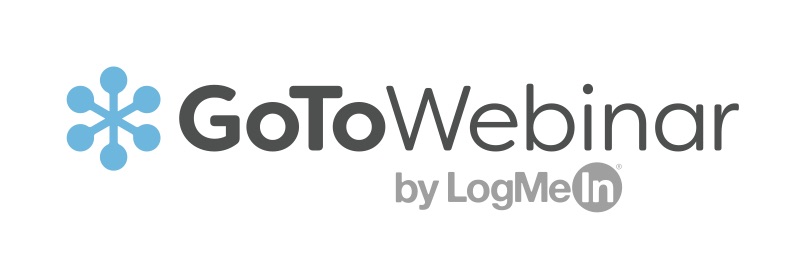
GoTo Webinar makes it easy to produce engaging online events. Whether you want to connect with your prospects, customers or employees, GoTo Webinar has the tools and analytics you need. Start creating interactive and educational webinars your audience will love.
Music credit: Noam Weinstein.
…sign up for free to continue reading

Don’t worry … it’s FREE!
Sign in with your preferred account, below.
Don’t miss a MarketingProfs podcast, subscribe to our free newsletter!
Published on September 12, 2019 Andy Crestodina, co-founder and CMO at Orbit Media Studios Inc., and author of the book Content Chemistry: The Illustrated Handbook for Content Marketing. Register now for the B2B Marketing Forum 2019 to see Andy’s presentation on Influencers, Search Rankings, and Collaboration. Use code B2BSmarts to save $150! And be sure to follow Andy on Twitter at @crestodina.
Andy Crestodina, co-founder and CMO at Orbit Media Studios Inc., and author of the book Content Chemistry: The Illustrated Handbook for Content Marketing. Register now for the B2B Marketing Forum 2019 to see Andy’s presentation on Influencers, Search Rankings, and Collaboration. Use code B2BSmarts to save $150! And be sure to follow Andy on Twitter at @crestodina.
Kerry O’Shea Gorgone is senior editor and writer at Appfire. She co-hosts The Backpack Show LIVE with Chris Brogan and Punch Out With Katie and Kerry, and serves as Consigliere and Showrunner for Chris Brogan Media. Once upon a time, Kerry was a lawyer (number one in her class at Suffolk University Law School).
You may like these other MarketingProfs articles related to SEO:
Keep me signed in
Sign in with your preferred account, below.
Over 600,000 marketers rely on MarketingProfs for B2B know-how every day. Don’t miss out on the latest marketing tips and techniques, delivered right to your inbox.
Subscribe today … it’s free!
Sign in with your preferred account, below.
Uncategorized
Google Ads & Automation Layering with Frederick Vallaeys [PODCAST] – Search Engine Journal
Join us in analyzing 3 case studies that show the importance of driving brand search behavior and engagement, and how to do it in months, instead of years.
Maximize your SEO efforts in 2024 with insights on Google’s SGE, algorithm updates, and expert tips to keep your site ahead.
Download this guide and learn how to optimize and manage Google Performance Max campaigns, with expert insights and actionable strategies to ensure your campaigns are effective.
Join us in analyzing 3 case studies that show the importance of driving brand search behavior and engagement, and how to do it in months, instead of years.
Join us in analyzing 3 case studies that show the importance of driving brand search behavior and engagement, and how to do it in months, instead of years.
Join us as we dive into exclusive survey data from industry-leading SEOs, digital marketers, content marketers, and more to highlight the top priorities and challenges that will shape the future of search in 2025.
Optmyzr’s Frederick Vallaeys discusses how PPC advertisers can take better control of their paid search campaigns with automation layering in Google Ads.
Podcast: Download
Subscribe: Apple Podcast Google Podcasts Spotify
For episode 166 of The Search Engine Journal Show, I had the opportunity to interview Frederick Vallaeys, Founder of Optmyzr and former Google AdWords Evangelist.
Vallaeys discusses how PPC advertisers can take better control of their paid search campaigns with automation layering in Google Ads.
Frederick Vallaeys (FV): [Y]ou’re given some automation options from Google so you can decide to manage bids manually to where you always have or you can decide to go on automated bidding. So it’s a choice and it’s a transition you make.
But then once in a while, something comes along like [changes to] close variants to match types. This is basically automation that you’re being forced to take – there’s no off button on these things.
This is driven by machine learning improvements that Google has and by them being able to better figure out what it is the user actually means when they type in whatever query and which advertisers do that match to.
But it kind of throws a wrench into the process that PPC experts have because we kind of know the world to be one way or Google maybe didn’t figure it out perfectly.
Now, all of a sudden they do figure it out, but not always perfectly. So what are we to do? How do we play in this new world?
Brent Csutoras (BC): [T]rusting the machine in some ways it’s kind of a nice thing for a lot of people, especially people that don’t have the experience. But, is this going to be something that advanced users are going to embrace in your opinion?
FV: I think you hit the nail on the head, so this is really built for the people who are not PPC experts.
So if you’re listening to this show, then you’re probably in the camp where you don’t like all of these automations quite so much, because they don’t always get it right.
But where Google’s coming from is obviously millions of potential advertisers who are not using Google Ads because it’s too complicated or they don’t get results.
And so as Google has this ability to actually use machine learning to figure it out, that’s a huge new market that opens up for them. And that’s why they’re pushing so heavily into this.
For the PPC experts, this is something that we have to keep a close eye on because we have gotten pretty good results by doing things manually and using the processes and tools that we have.
One of the concepts that I’ve recently started talking about is automation layering and it’s a pretty simple concept.
The engines, like Google, are going to have their black box methodology that automates whatever it is that they’re automating today. It could be keywords, bids, ad text, and so on. They’re going to use machine learning and do a pretty decent job for the most part.
But there’s going to be instances when we wish we had a bit more transparency and understood what was happening inside the black box.
We want to find those one-off instances when the machine is actually getting it wrong for whatever reason, and that’s where we can build simple automation, that layer on top of the Google system.
These simple automations don’t even have to be machine learning or artificial intelligence. They could simply be an if-this-then-that type of logic rule.
For instance, if all of a sudden you see Google starting to show your ads for close variant, exact match keyword, and for some reason the results from that are bad or you’re seeing it’s like a semantically too different from the underlying keyword, you can put your own automation on top of that that says, “Hey Google, stop doing that.”
So now you get five impressions before we have the data to say this is happening, but then it shuts it off. And so you’re protecting yourself and you’re still maintaining your role as that PPC expert who’s tightly controlling what’s happening with that account.
FV: There’s a couple of levels.
First of all, think about how Google works.
When Google makes decisions about what it considers to be close variants, it’s basically using machine learning and it’s using percentages of similarity.
And so they may determine that a query seems to be 85% similar to the keyword that you had. Now, it’s up to them to decide whether that 85% meets the threshold for showing the ad. That’s something they control.
In automation layering, you can actually step in and you can do your own sort of metrics analysis.
So you could say, “Well, we don’t care so much about how closely it’s related, but we’re going to look at the stats. So let Google show these close variants. But if we see that they perform at a much lower level of conversion rate, then we opt to step in, take action and make it a negative.
One specific way you can do this is through automated rules in the Google Ads system, or you could build a Google Ads script. I’ve published some ad scripts on Search Engine Journal and my GitHub.
Obviously you could use the much simpler options that we have in our tool Optmyzr, but then you have to pay a little bit of money to use that tool.
But the notion is simply, if a query that is a close variant is showing these performance attributes then automatically make it a negative keyword. Or at the very least, send me an email about it so that I know this is happening.
Then I can still make my own human judgment about whether I should keep that as a close variant or maybe I should just add it as its own keyword, but just put a lower bid on it because maybe it’s not performing at the same level.
BC: I think what’s interesting is being able to determine what performs, but there’s another aspect here and that’s being able to improve upon your account…
FV: Exactly. There are two levels of improvement. You get those micro improvements that you can do and then thanks to automation, you can help to also start spending time on the more strategic tasks because you don’t have to worry about every single keyword that’s out there.
When I think about the future of the PPC role, it’s not about us doing a lot of manual work to stay on top and then roll over these Google automation systems.
It’s about being smart and layering on your own automation, or better through a script, tool or an API solution that you build if you’re a really big company.
But you have to basically be on top of what those automations are doing and then be more strategic.
FV: On the targeting side, that would be the main one. You have a lot more options.
Automated bidding is probably the biggest thing people talk about when it comes to automation. But you do have the option of not using it.
Not using bid automation at any level, I think, is just completely the wrong thing to do… I’m not saying you have to use Smart Bidding from Google, what I’m saying is that you have to layer some level of automation on top of your manual process.
You can’t do these things manually at the scale, at the efficiency that a machine learning system like Google’s could do it. And audiences actually kind of ties into this, because the reason it’s even possible today is because of machine learning.
Visit our podcast archive to listen to other Search Engine Journal Show podcasts!
Image Credits
Featured Image: Paulo Bobita
Managing Partner / Owner at Search Engine Journal with over 18 years experience in Digital Marketing, specializing in Reddit, Search …
Conquer your day with daily search marketing news.
Join Our Newsletter.
Get your daily dose of search know-how.
In a world ruled by algorithms, SEJ brings timely, relevant information for SEOs, marketers, and entrepreneurs to optimize and grow their businesses — and careers.
Copyright © 2024 Search Engine Journal. All rights reserved. Published by Alpha Brand Media.
Halda Launches AI SEO to Empower University and College Enrollment Marketers with Data-Driven Content Insights for Higher Education Websites – Business Wire
Halda’s AI SEO Dashboard (Graphic: Business Wire)
Halda’s AI SEO Dashboard (Graphic: Business Wire)
PROVO, Utah–(BUSINESS WIRE)–Halda is excited to announce its latest innovation, AI SEO, a cutting-edge feature designed to give college and university enrollment teams the tools they need to optimize website content, fill information gaps, and improve the quality of AI-generated answers sourced from their content on search engines. AI SEO enables a new level of precision and speed in identifying and filling content gaps to ensure institutions present accurate, student-centered information. By allowing marketing teams to quickly address these gaps without waiting on IT or web development teams, Halda continues to redefine how higher education institutions can leverage websites to more effectively reach prospective students.
How AI SEO Benefits Enrollment and Admissions Marketing Teams
Website optimization has undergone a fundamental transformation in the last two years. For decades, search engine optimization (SEO) focused on helping search engines index and rank content. Now, with the rise of AI-powered search and summarization tools, institutions must adapt to a new paradigm: AI-optimized content.
Modern AI platforms like ChatGPT, Gemini, and Claude do more than just index websites—they actively summarize and deliver institutional information to prospective students. The critical question is: Are these AI systems accurately representing your institution’s unique value, mission, and offerings?
AI SEO from Halda helps higher education institutions overcome this challenge by identifying content gaps and how AI summarizes their existing content. This enables institutions to correct inaccuracies and provide additional content that AI can summarize. Without a tool like this, institutions are blind and losing prospective students before they visit their websites.
“In an AI-driven world, Halda AI SEO is redefining what SEO means for higher education,” said Jon Grover, VP of Product. “With traditional approaches becoming insufficient, institutions must ensure their content is crafted intentionally for AI summarization. Without a proactive strategy that is made easier with AI SEO, schools risk losing prospective students who find answers in search engines without ever visiting the institution’s website.”
How AI SEO Works
AI SEO provides intuitive, data-rich analytics tailored for strategic web optimization and student-first content planning. By analyzing institutional website content, it highlights content gaps and shows how AI interprets and summarizes existing information. This empowers enrollment marketers to identify and address missing or outdated content immediately:
AI SEO from Halda empowers enrollment marketers to take a proactive, strategic approach to identifying and addressing web content gaps, ensuring that the institution’s website meets student expectations. Without a tool like this, institutions remain blind to significant content gaps and risk losing prospective students before they even visit their website.
For more insights on improving student engagement and increasing prospective student conversion through AI SEO, visit https://www.halda.ai/post/aiseo.
About Halda
Halda is the first AI-powered enrollment marketing platform that unifies marketing campaigns, websites, and CRMs for a streamlined and effective approach to student recruitment. With Halda, institutions gain access to high-performing, ready-to-use playbooks that can be instantly tailored to match any institution’s brand and voice, driven by advanced artificial intelligence for optimal impact.
Halda’s Personalization Platform offers a suite of AI-powered tools designed to engage and convert prospective students:
Institutions using Halda see improved student experiences—with over 90% of students finding Halda’s assets helpful—and a notable increase in lead volume, typically doubling or even quintupling leads without requiring a website rebuild. Additionally, Halda’s automated lead attribution delivers transparency, helping institutions allocate budgets effectively by identifying high-performing campaigns.
For more information on Halda and the upcoming release of AI SEO, please contact us at press@halda.ai or visit our website at Halda.ai.
Nichole Keele
nichole@halda.ai
Nichole Keele
nichole@halda.ai
Tony Wright on the Danger of Absolutes in Marketing, Answering SEO Questions & More [PODCAST] – Search Engine Journal
Join us in analyzing 3 case studies that show the importance of driving brand search behavior and engagement, and how to do it in months, instead of years.
Maximize your SEO efforts in 2024 with insights on Google’s SGE, algorithm updates, and expert tips to keep your site ahead.
Download this guide and learn how to optimize and manage Google Performance Max campaigns, with expert insights and actionable strategies to ensure your campaigns are effective.
Join us in analyzing 3 case studies that show the importance of driving brand search behavior and engagement, and how to do it in months, instead of years.
Join us in analyzing 3 case studies that show the importance of driving brand search behavior and engagement, and how to do it in months, instead of years.
Join us as we dive into exclusive survey data from industry-leading SEOs, digital marketers, content marketers, and more to highlight the top priorities and challenges that will shape the future of search in 2025.
Tony Wright of WrightIMC shares inspiring career stories, big tips for industry newcomers, aspiring conference speakers, and would-be writers, and more.
Podcast: Download
Subscribe: Apple Podcast Google Podcasts Spotify
“What you’re doing for your car dealership may not necessarily work for the lady who’s running the hair salon down the street. That is a huge deal to understand that there’s not a magic formula and people don’t get it. A lot of the worst advice that I’m seeing is coming out with absolutes and that, ‘You need to do this.’ Frankly, most of the time, you may or may not need to do that.”
Tony Wright’s work has earned him the accolades of “search marketing and social media expert,” although he says he prefers the term “geek.”
One look at his bio and you’ll know he deserves to be called that and more.
He has been in the digital marketing industry for 21 years with previous experience in journalism, public relations, and advertising.
Tony is also well-known for speaking at major search conferences and contributing to leading industry publications, including Search Engine Journal. And we’re lucky to have him as a contributor!
Aside from consistently turning in his monthly column days – even weeks – ahead of the deadline, every piece that Tony writes tells a story that resonates with readers.
On writing, he has this to say:
“[I]f you can engage someone and get them to think about something, whether I’m writing something or I’m doing a sales pitch, my goal, at the end of the day is I want someone to exclaim, ‘I never thought about it like that.’”
In today’s edition of The Search Engine Journal Show, I talk to Tony Wright – an SEO pro everyone in the industry should get to know better.
Tony Wright is the CEO of WrightIMC, a full-service digital marketing agency based in the Dallas, Texas area.
In the past, he was the Director of Digital at Weber Shandwick, the largest PR firm in the world.
He is currently a regular contributor to Search Engine Journal and he will be one of our four columnists sharing the Ask an SEO column this year.
In the past, you may have read him on Search Engine Watch, Forbes, and other publications. He has also spoken at Pubcon, State of Search, SMX, and many others.
Tony has won quite a few awards over the years as well, including Excellence in Interactive Marketing, AMA Marketer of the Year, Outstanding Alumnus of Texas Tech University, and more.
Listen to this episode and get to know more about Tony’s life and career stories, his big tips for industry newcomers, aspiring conference speakers, and would-be writers, and more.
How to connect with Tony Wright
Twitter | LinkedIn | WrightIMC
This podcast is brought to you by Ahrefs and Opteo.
Visit our podcast archive to listen to other Search Engine Journal Show podcasts!
Image Credits
Featured Image: Paulo Bobita
Danny Goodwin is the former Executive Editor of Search Engine Journal. He formerly was managing editor of Momentology and editor …
Conquer your day with daily search marketing news.
Join Our Newsletter.
Get your daily dose of search know-how.
In a world ruled by algorithms, SEJ brings timely, relevant information for SEOs, marketers, and entrepreneurs to optimize and grow their businesses — and careers.
Copyright © 2024 Search Engine Journal. All rights reserved. Published by Alpha Brand Media.
Affiliate Marketing Trends, Crazy PR Stunts & Dropping F-Bombs with Adam Riemer [PODCAST] – Search Engine Journal
Join three of Reddit’s top executives in this exclusive AMA (Ask Me Anything) to discover how you can tap into Reddit’s unique platform to drive brand growth.
Maximize your SEO efforts in 2024 with insights on Google’s SGE, algorithm updates, and expert tips to keep your site ahead.
Download this guide and learn how to optimize and manage Google Performance Max campaigns, with expert insights and actionable strategies to ensure your campaigns are effective.
Join us in analyzing 3 case studies that show the importance of driving brand search behavior and engagement, and how to do it in months, instead of years.
Join three of Reddit’s top executives in this exclusive AMA (Ask Me Anything) to discover how you can tap into Reddit’s unique platform to drive brand growth.
Join us as we dive into exclusive survey data from industry-leading SEOs, digital marketers, content marketers, and more to highlight the top priorities and challenges that will shape the future of search in 2025.
Get to know online marketing veteran Adam Riemer better and his thoughts on affiliate marketing trends, crazy PR stunts, and more.
Podcast: Download
Subscribe: Apple Podcast Google Podcasts Spotify
“I have a requirement and people that have worked for me can vouch for this. Within the first five minutes of an onboarding call or initial call, we swear twice. One of them has to be an F-bomb. The main reason is pretty much if you’re going to work with me and my team, you’re working with creatives. I like to say people don’t hire us for brain power, they hire us for the crazy.”
He’s done a lot of things to get links – from sponsoring drag queens at a drag race to dressing chihuahuas up in tacos and Wiener dog costumes with URLs on them and sending them to races where the media is going to be.
Some might call these ideas crazy. Yet they work.
That’s part of why companies hire Adam Riemer.
He and his team can come up with those really crazy PR stunts that don’t cost much money but generate a positive media response.
“We like to come up with really cool ideas and keyword expansions and unique things you probably haven’t thought of. Some of them can be a bit outlandish…”
But more than the eccentricity surrounding his marketing ideas, Adam is one of the smartest and most helpful people I know – and we’re lucky to have him in the community.
In today’s edition of The Search Engine Journal Show, get to know long-time online marketing veteran Adam Riemer better.
Adam is a Digital Marketing Strategy and Execution Consultant and is the CEO of Adam Riemer Marketing.
He has been in the industry for more than 15 years with experience in SEO and ethical affiliate management, among others.
He’s a two-time Affiliate Summit Pinnacle Award winner for Affiliate Manager of the Year.
In addition to writing on his own blog at AdamRiemer.me, he is currently a contributor to Search Engine Journal. This year he’ll be one of our columnists sharing the Ask an SEO column on Search Engine Journal.
He has spoken at tons of conferences including Pubcon, Big Digital Adelaide, Affiliate Summit, ShiftCon, and many more.
Listen to this episode of the Search Engine Journal Show as Adam and I talk about affiliate marketing, crazy PR stunts, and more (with some F-bombs dropped along the way.)
How to connect with Adam Riemer:
Twitter | LinkedIn | Instagram | AdamRiemer.me
This podcast is brought to you by Ahrefs and Opteo.
Visit our podcast archive to listen to other Search Engine Journal Show podcasts!
Image Credits
Featured Image: Paulo Bobita
Danny Goodwin is the former Executive Editor of Search Engine Journal. He formerly was managing editor of Momentology and editor …
Conquer your day with daily search marketing news.
Join Our Newsletter.
Get your daily dose of search know-how.
In a world ruled by algorithms, SEJ brings timely, relevant information for SEOs, marketers, and entrepreneurs to optimize and grow their businesses — and careers.
Copyright © 2024 Search Engine Journal. All rights reserved. Published by Alpha Brand Media.
